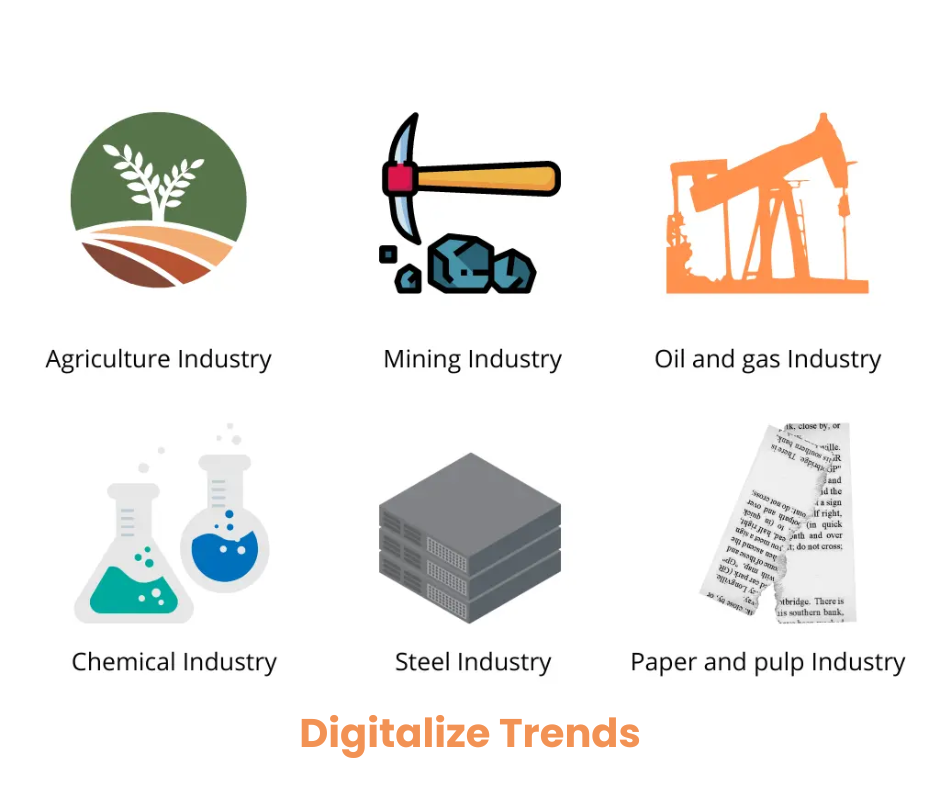Every individual wants a career of their interest and where they get ample growth prospects in the future. Basic industries offer exciting opportunities and allow individuals to explore their potential and work better and more productively. But why are these industries so popular amongst job seekers?
Well, today, in this blog post, we will discuss the best-paying jobs in basic industries and how one can pick the right opening to take the right step toward a brighter future. But before we venture into the details, let us first try to understand the sectors that fall under basic industries and what types of products and services are offered by them.
What are Basic Industries?

When we talk about basic industries, these can be defined as the sectors that directly impact the lives of common people since the products are extensively used in daily routines and are common for all segments of society. There has been substantial growth in the basic industries, which has led to more job opportunities. This is great news for job seekers who know that basic industries are a good career path and that they should pursue them without any concerns.
Basic industries have a pivotal role in the economic growth of a country as they serve as the backbone, and the products they produce serve as raw materials for all other important industries. As these sectors are growing, the basic sectors are expected to meet the increasing demands by making the best use of technology and a well-trained workforce. Most basic sectors deal with the extraction of natural resources and basic services that are required for smooth functioning.
Types of Basic Industries
Several sectors fall under the basic industry segment based on the products and services they have to offer. Before a person decides upon the role, it is essential to understand the different industry types as this will help one choose the right opportunity that matches the interests and competitiveness. So, here are a few sectors that fall in this category and some appealing job profiles for seekers:
Oil and Gas Sector:

The use of oil and gas is common, and with increasing consumption rates, the industry is growing exponentially, which makes it a great sector to work in. The upstream segment of this sector deals with the production and exploration of oil. The companies involved in the midstream segment deal with product storage and transportation.
Finally, the companies working in the downstream segment refine and clean the crude oil through various processes and technology. There are several concerns about the methodology used in the oil and gas industry since the by-products released during refining have harmful effects on the environment. There are different profiles in this industry, such as oil field workers, geoscientists, oil rig workers, petroleum geological engineers, and more.
Agriculture:

One of the most crucial sectors in any country, agriculture has a significant role to play. Basic food products like crops, fruits, and vegetables are included here, which serve an essential role in the food supply chain and consumption.
Also, products derived from this sector are crucial for industries that deal with processed foods as they are dependent on raw materials. Some common profiles that individuals interested in this sector can consider are plant scientists, agronomists, food scientists, etc.
Timber Industry:

Wood is extensively used in several forms to make furniture, paper, packaging materials, structures, and more. Therefore, this industry needs to grow and develop new techniques that enhance productivity and quality.
Mining:

The extraction of natural resources that are required by other industries to function properly falls under extraction and mining. The minerals, coal, and other materials obtained from this sector make it a great industry to work in.
Geotechnical engineer, purchase officer, and mining engineer are some career options that you can check for.
Chemical industry:

The chemical industry involves the involvement of chemicals in any form in jobs like lab assistants, chemists, material scientists, etc. Other sectors use these chemicals as raw materials for processing the product.
Metal Industry:

Companies deal in metal products like beams, pipelines, and steel, which are further used in the construction or automotive industry. These industries depend on metal makers and hence form the backbone of any economy.
Characteristics of Basic Industries
Every industry type works on a certain framework and thus has characteristics that are unique to it. For basic industry, the main factors are:
- Even though basic industry deals with products and services used in daily life, it demands skilled and knowledgeable individuals who perform their roles with efficiency and precision since there is no scope for error.
- Professionals working in industries like mining, oil and gas, etc., are involved in complex processes that are risky. Thus, every individual needs to take precautions and follow process guidelines strictly to ensure safety.
- When we talk about the nature of work, most industries demand more physical work compared to mental involvement.
- The processes of basic industry do affect the environment since natural resources are involved; thus, it becomes crucial to attain sustainable techniques to reduce the impact intensity in the long run.
Related Article: What Companies are in the Basic Industries Field?
What are the Job Opportunities in Basic Industries?
Basic industries offer new career paths for passionate individuals who wish to work hard to build a successful career and stay active in their profiles. Being a labor-intensive industry, a person needs to be physically fit and mentally to devote hours of labor without affecting productivity levels.
There are numerous roles in different sectors, and every profile demands a specific skill set that one needs to have to pursue the career. Some very popular roles that individuals wish to pursue are:
- Drilling and mining engineers in mineral fields for resource extraction.
- Metallurgists who work with miners and guide them with the best usage of technology.
- Agronomists who assist farmers and let them attain production at large scales.
- Conservation scientists who work in the forestry sector and share valuable inputs on sustainable practices.
- Textile workers include makers, designers, and textile products.
What does a Person Need to Know about a Basic Industry Career?
The basic industry deals with the production and supply of raw materials that are vital for other sectors. These raw materials are derived from nature and are usually found in a crude state, which calls for refining or processing to obtain usable forms.
Thus, once refining is done, it is also available for end-customer usage; for example, gasoline and diesel obtained from the oil and gas industry are used by sectors as well as end users. Most companies desire trained professionals.
Hence, they establish in-house training programs where individuals gain knowledge of the technical aspects involved and the right approach for maximizing production without adversely affecting the environment. There are four major branches of basic industries:
- Siderurgica: This deals with the manufacturing and treatment of metals like cast iron and steel.
- Metallurgist: The professionals in this segment are involved in the production of metals and their alloys, such as gold, bronze, and silver.
- Cement: This product is a basic raw material for the construction industry since infrastructure development is only possible with cement, iron, and metal.
- Petrochemical: Raw materials like natural gas, liquefied petroleum, and kerosene are included in this branch.
Education to Enter the Field
The basic industries are a broad category that includes many different types of jobs, from manufacturing to retailing. To be able to work in one of these industries, you will need some sort of formal education and training.
Education in Basic Industries Basic industry careers often require a degree in engineering or technical fields. To enter the manufacturing process sector, for example, you will need an undergraduate degree in engineering or technical fields. If you want to work in the retail industry, then you will need either an associate’s degree or a bachelor’s degree in commerce or business administration.
However, your salary will skyrocket if you are willing to go to high school diploma to earn a degree. Take the example of derrick operators. This is how it works: A derrick operator makes about $50k/year. A petroleum engineer, however, earns nearly triple that amount ($137.330/year).
There is no one-size-fits-all answer to this question, as the minimal education requirements for each basic industry vary depending on the specific job that you want to pursue.
However, whatever your educational goals are, it is important to do your research and find out exactly what is required before starting college or university.
This way, you’ll be prepared for anything that comes your way and won’t have any difficulty finding a job once you’ve graduated.
Why are Basic Industries a Good Career Path?
So, now that we have had an in-depth analysis of job opportunities in basic industries let’s have a look at what makes the job profiles a good career path for individuals looking for roles:
- Most basic industry job profiles demand physical strength and stamina, which keeps an individual healthy and fit with little effort.
- Even the entry-level job profiles offer attractive compensation, which makes the individual financially independent.
- The satisfaction levels are high because people get paid for the projects they pursue, and there are set benchmarks that clarify goals.
- There are immense growth opportunities in future that an individual can pursue as he gains experience and technical know-how.
How To Succeed In The Basic Industries?
To achieve success in the basic industry career path, it is important to have a clear understanding of the industry and what it takes to be successful in it. There are a few key things to keep in mind when pursuing success in basic industries.
First, it is important to have a good grasp of the basics. This means understanding the fundamental concepts and principles that govern the industry. Without this basic understanding, it will be very difficult to achieve success.
Second, it is important to be able to apply the basics practically. This means being able to use the concepts and principles in a real-world setting. If you can’t apply what you know in a practical way, then it won’t do you any good.
Third, it is important to be persistent. Success in the basic industries requires a lot of hard work and dedication. There will be times when it seems like you’re not making any progress, but if you keep at it, you will eventually see results.
What do Basic Industry Jobs Pay?
Here, we have listed some common yet crucial job profiles in the basic industries and shared the compensation paid to each of them. Remember, this is an average salary, and the actual figures may vary depending on the person’s efficiency.
- Miner jobs: $44,000
- Machinist: $45,000
- Textile designer: $64,000
- Electrician: $59,190
- Health and Safety Officer: $54,000
Pros and Cons of Being Employed in the Basic Industries
Like any other industry, there are pros and cons associated with job profiles in basic industries, which every seeker should be aware of so that there aren’t any regrets later. Here, we have listed some of them to give you clarity on what to expect:
PROS
- Basic industries are set to expand, which means there will be entry-level jobs that freshers can opt for since they do not demand experience.
- Basic industry profiles are high-paying jobs, which makes them an attractive choice.
- There is job stability since other sectors rely on these companies, which means one needs to keep working hard and grow even if there has been an economic slowdown.
- Skill upgrades through training programs let individuals gain knowledge and stay up-to-date on technological advancements in the field.
CONS
- Most sectors in basic industries are labor-intensive, which means long work hours and physical strain. Therefore, one needs to be prepared to face such challenges in advance.
- In sectors like mining, agriculture, oil, and gas, workers must work outdoors in extreme weather conditions, which may not be comfortable.
Future of the Basic Industries
If you consider the future of basic industries and if your job will be a safe option, you can count upon the opportunities and grab one that matches your qualifications, desired profile, and interests.
The future is undoubtedly bright, and if you give your best, you will come across ample opportunities that will let you attain your career goals. With the technological advancements and involvement across industries, you can easily upgrade your skills by pursuing training programs and certifications for an added competitive edge.
Is Basic Industries a Good Career Path in 2024? Yes, it is if you are all set to deliver your best and evolve with the changing trends.
What Salary can You Expect to Make in a Basic Industry as a Career Path?
One crucial aspect of any career path is compensation, and in basic industries, the average salary is $30,000. The pay scale is broad, considering the education and experience one has. If one joins an entry-level job and works consistently, the salary can go up to $65,000 or more.
Compensation is higher in executive and management positions, which has called for in-depth knowledge of the sector and productivity over the years. Thus, an individual who wants to make a career in a basic industry should be mentally prepared and put in the best efforts to attain the career goals.
Key Takeaways
Basic industries have a crucial role in the country’s economic growth, and every government puts in its best efforts to boost this sector since it understands its importance. A country that is self-sufficient in basic goods and services saves significantly on import costs, which has a huge positive impact on growth. Thus, individuals who work in basic industries are assured of growth and job stability, which makes it an attractive package.
The secret to getting hired by a leading basic industry player is simple: prove your proficiency and zeal, and you will hit the right goal. Make sure you continually upgrade your skills by enrolling in certifications that address the latest trends in the industry, as this will give you a competitive edge over others.
Also, when you are looking for a job in the basic industry, be ready to work hard, both physically and mentally, since most companies in the basic sector involve extensive ground or fieldwork. Indeed, basic industries offer enticing job opportunities, but remember, success comes only when you strive for it and do your best. If you have the qualities, the basic industry is the best sector to work in, and you are assured of a bright future that will let you attain all the personal milestones that you desire.
FAQs
Q: Why are basic industries important?
A: Basic industries are important for individuals and the country since they include essential products and services. Most sectors are dependent on basic industries for their raw materials, and hence, they must function seamlessly and meet the demands without fail.
Q: What industry is high in demand?
A: Agriculture, mining, oil, and gas are some basic industry types that are in demand since the consumption of food, minerals, and gasoline has risen in past decades. With an increasing consumer base every year, the trend is set to continue, which signifies that the growth prospects of the basic sector are bright and strong.
Q: Which sector is best for career growth?
A: Individuals who want job stability, growth opportunities and handsome compensation opt for job opportunities in basic industries. This is because the sector has immense growth potential due to the expansion plans and support by the governments.
Q: What is the basic industry?
A: An organization that falls under basic industry deals with primary goods and services like food, coal, steel, metal, mass communication, etc. These products are included in our daily lives, and hence, uninterrupted supply is a must.
Q: What are the basic good industries?
A: Basic goods are products that a common man uses every day, without which there will be hurdles in seamless operations, such as food, metal for automotive and construction, and oil and energy supplies. The companies that deal with such products are termed essential industries.
Q: Which industry is called the basic industry, and why?
A: The definition of basic industry lies in the word itself: products and services that meet an individual’s basic needs. Organizations involved in manufacturing, producing, and extracting such products through mining, technology, and extraction processes are termed basic sectors.
Q: Which sector will boom in the next 5 years?
A: Experts believe that companies that fall in the basic industry are set to grow exponentially in the next 5 years and beyond. The prediction is simple because with increasing population and enhanced spending capabilities, the demand for basic goods and services will rise, pumping the growth ahead.
Q: Which industry earns the most?
A: Basic industries contribute a significant share to any country’s economy because every individual spends money buying essential goods and services, like food, clothing, energy, gas, etc., irrespective of the segment they belong to. Thus, companies that offer basic products are the leading earners compared to any other sector.
Q: Which is the richest industry?
A: In a country’s economic graph, a significant contribution comes from basic industries, as these are suppliers of raw materials for other sectors and basic goods for individuals. Thus, when discussions about the richest companies are done, the players from basic industries top the chart.
Q: Which job is best for a good future?
A: Every person wants to pursue a career path that would help them grow, earn a good salary, and stay stress-free as they put in their best efforts. The basic industries render outstanding job profiles from entry-level to top-level, and individuals can pursue them for a bright future.



